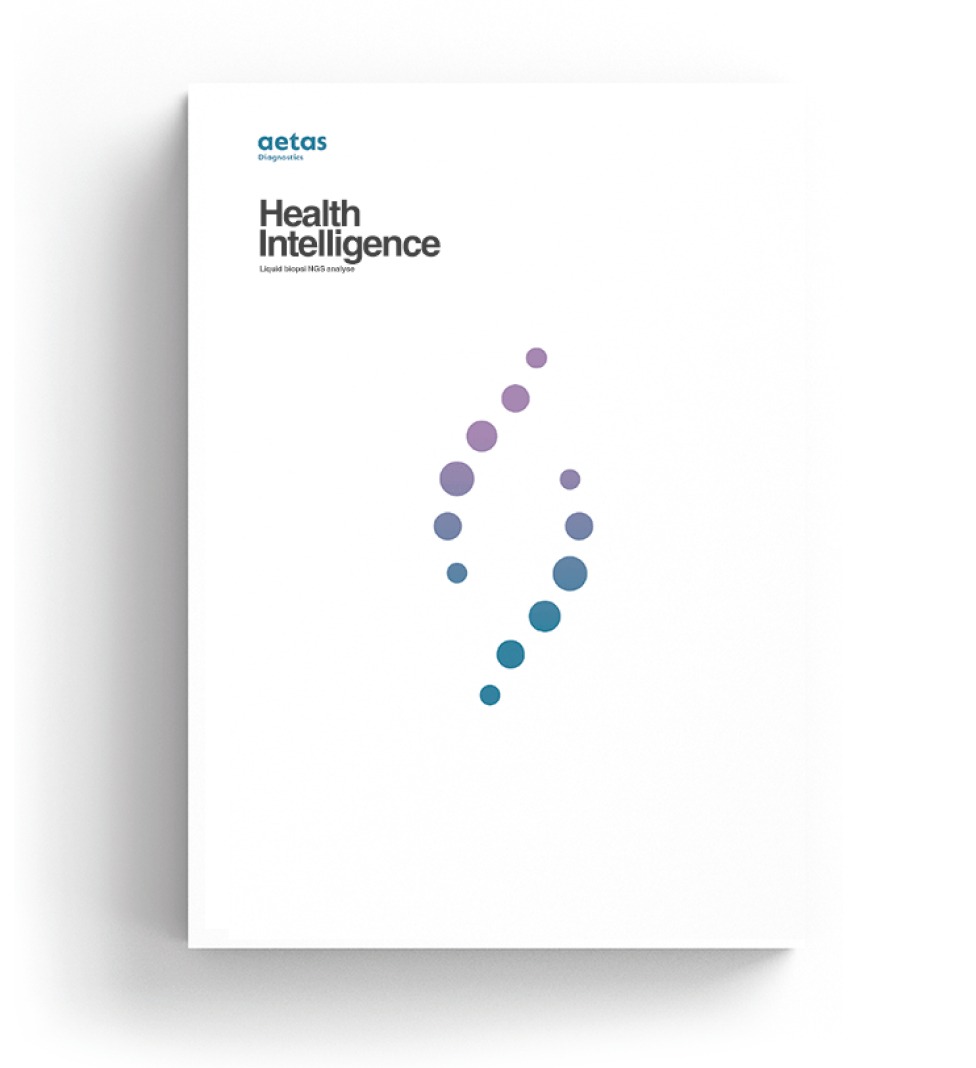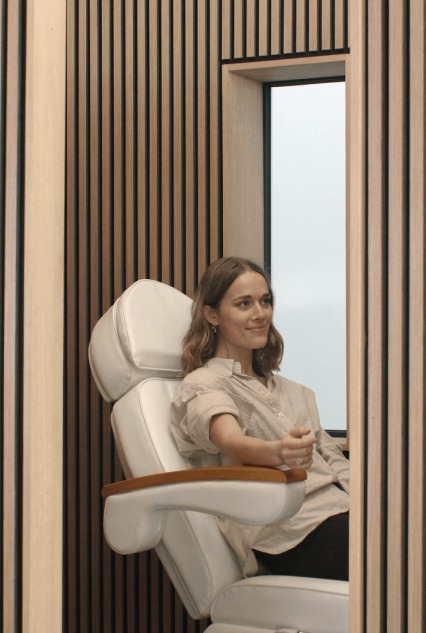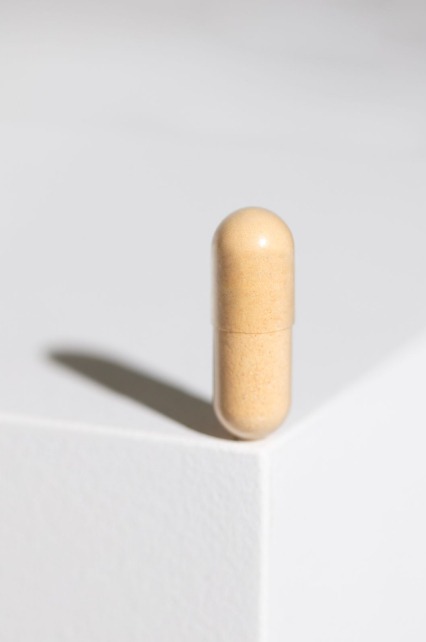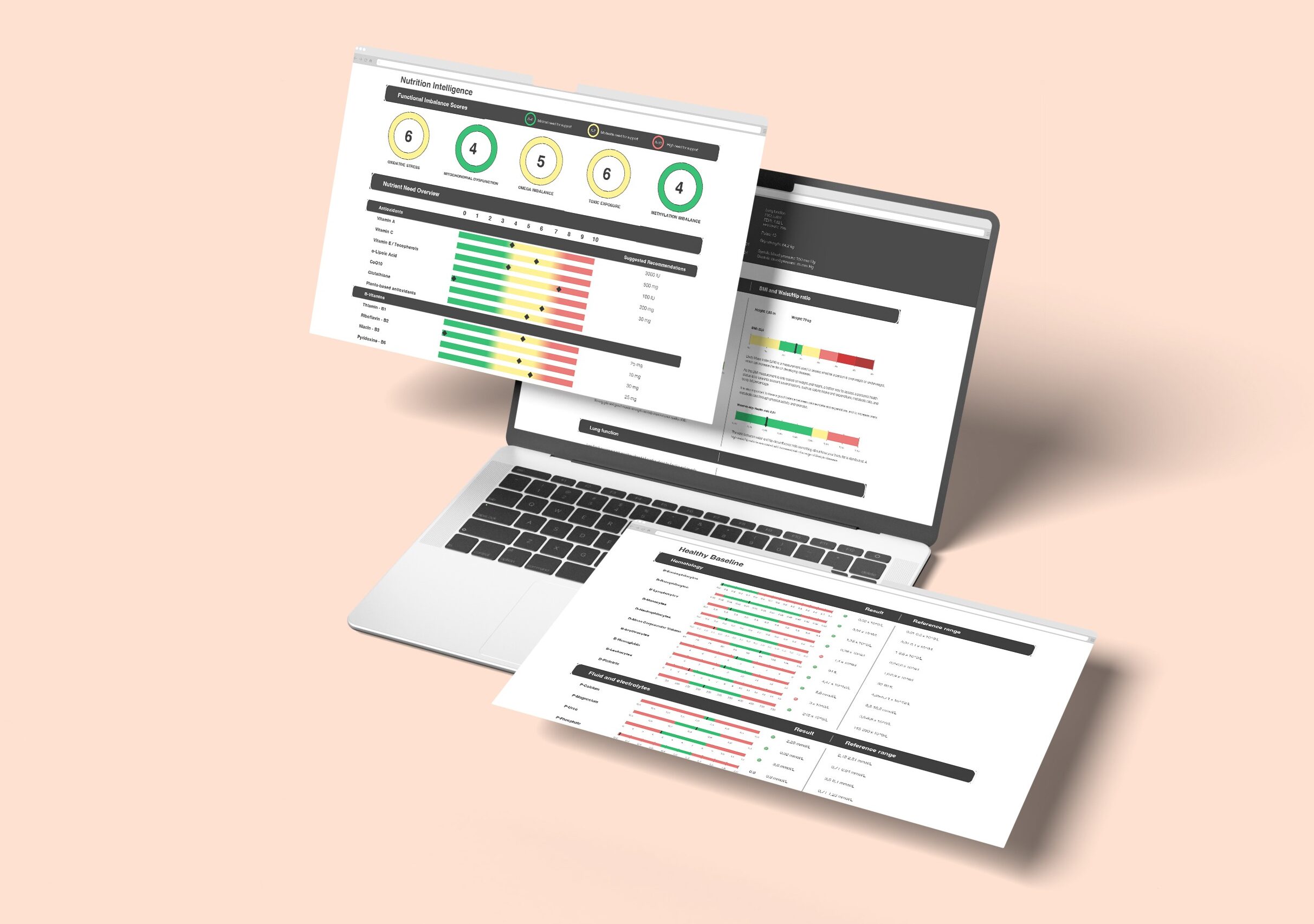Advanced Health Examination

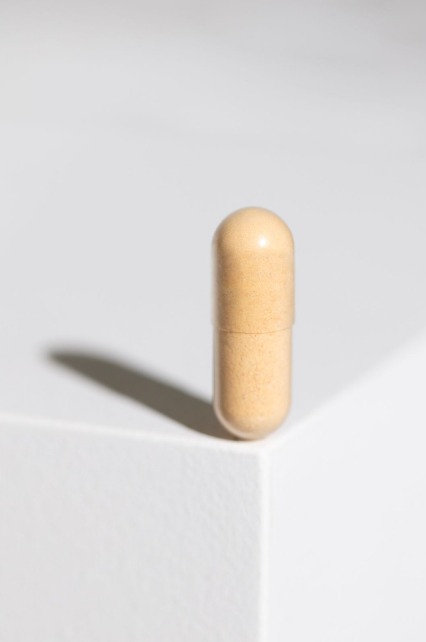
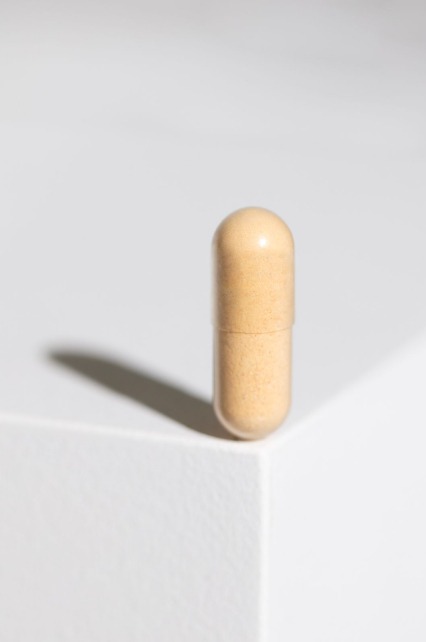



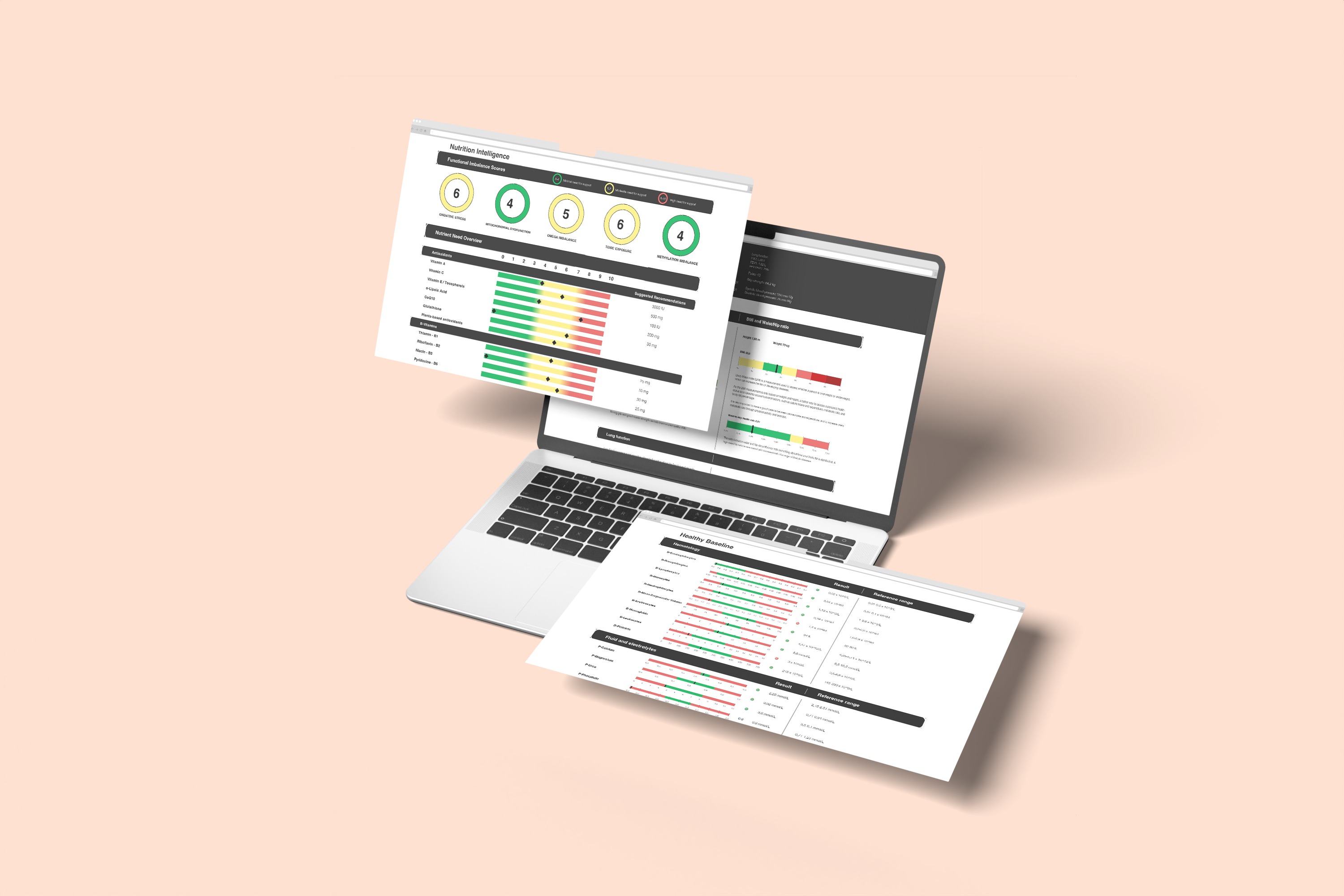

What is the process?

1
2
3
4

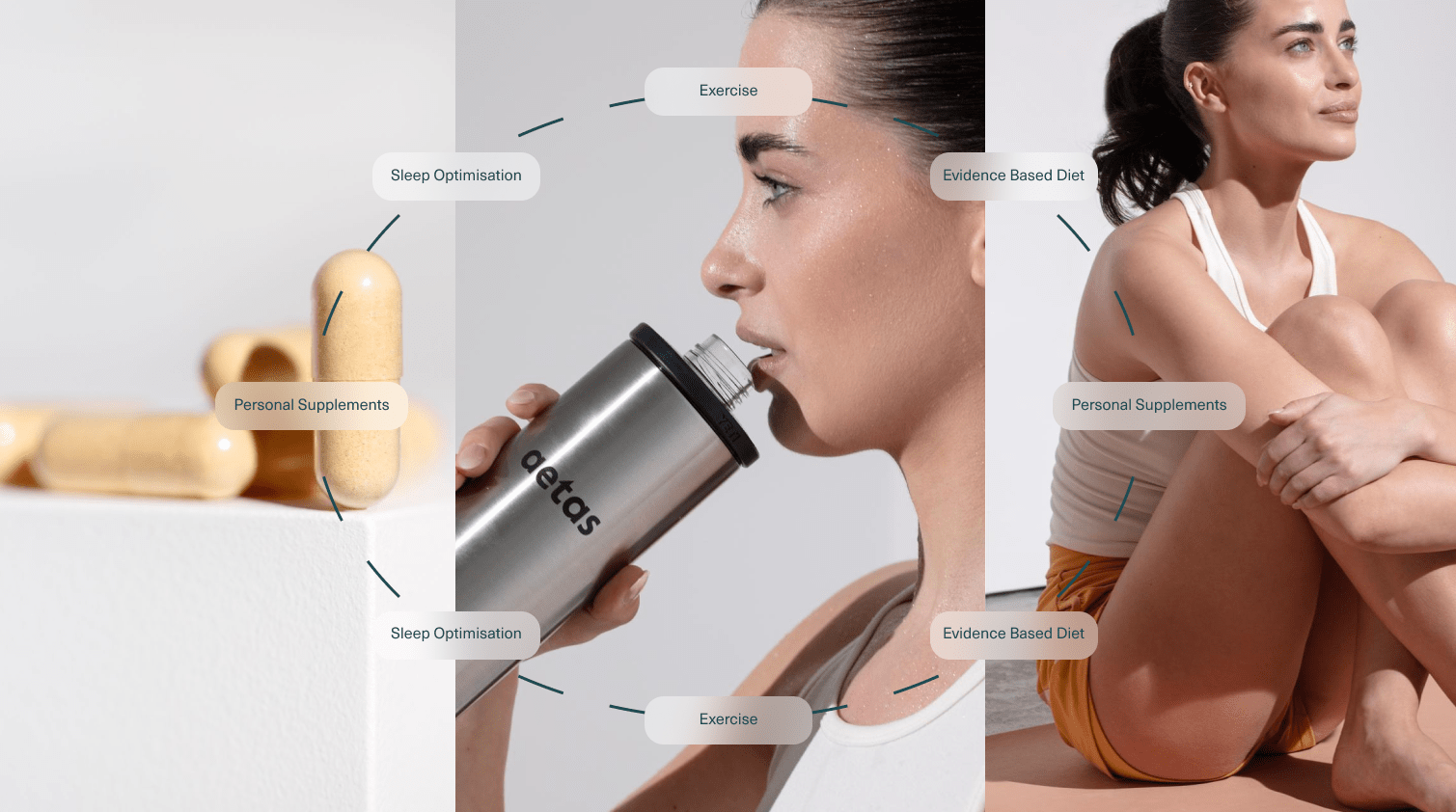

Personal protocols to The Pillars of Longevity
1
2
3
4

Book your appointment now

Clinical blood tests
60 clinical diagnostic biomarkers for heart, lipid, liver, kidney, pancreas, thyroid, blood, electrolytes, inflammation, hormones, and metabolism.
Physiological examinations
8 vitals including height, weight, BMI, waist-to-hip ratio, blood pressure and pulse, grip strength, lung function, and EKG.
DEXA Body Scan
The Health Intelligence examination includes a DEXA Body Scan, providing in-depth insights into your body composition, including the amount of visceral fat around your organs, your body fat percentage, and muscle mass. Visceral fat is a crucial marker for assessing your risk of diseases.
Advanced nutrient analysis
This analysis includes 125 biomarkers through blood and urine samples, providing precise information about nutrient levels in your body, helping identify any deficiencies. By examining your body’s needs for antioxidants, vitamins, minerals, essential fatty acids, amino acids, and other nutrients, we can tailor dietary recommendations and supplement suggestions to provide only the necessary nutrients to your body.
- Analysis of organic acids can provide insight into potential issues in the body’s metabolism, such as nutritional needs, digestive problems, energy production in cells, neurotransmitter turnover, and detoxification.
- Oxidative stress is a condition where the amount of free radicals exceeds the amount of protective antioxidants, which can lead to illness and premature aging.
- Amino acids are crucial in many different biological processes. We analyse both essential and non-essential amino acids to gain insight into issues with digestion, absorption, or metabolism.
- Fatty acids are relevant to many processes in the body, including regulating inflammation, signalling between cells, and building fats.
Methylation Profile with Biological Age and Metabolic Index
It is an inevitable reality that we age, but how and how quickly we age vary from person to person. Chronological age is a necessary reference point, but it can be a very misleading indicator of your overall health. Your lifestyle, mental health, nutrition, stress management, and sleep all have significant impacts on your health. This means that some people are biologically younger than their chronological age. For others, the situation may be reversed, and they may actually be ‘biologically’ older, thus having a higher risk of developing diseases.
We calculate your body’s biological age through an epigenetic age determination test. Epigenetic changes in the form of DNA methylation patterns can be used to calculate the biological age of cells. The epigenetic clock essentially represents how biologically old you are.
In short, the difference between biological and chronological age can serve as a measure of how healthy your aging is. That is, if you are older than your calculated biological age, it signifies healthy aging.
suPAR Health
suPAR is a protein measurable in the blood, reflecting the activation level of the immune system, also known as inflammation. The test provides valuable information about your current health status, the effectiveness of your health efforts, and your future disease risk.
A low level of suPAR protein in the blood indicates good health, suggesting that your body is currently thriving with your current lifestyle. A high level allows for proactive identification of underlying causes in advance. This enables you to strengthen your health through lifestyle changes and proactive disease prevention.
In the Health Intelligence package, two suPAR tests are included. One is conducted during the examination, and the other is a follow-up test after 3 months. This allows for a detailed understanding of your health development and helps determine the effectiveness of your new lifestyle.
Genetics
In the Health Intelligence package, we analyze your genetic variants; APOE, MTHFR, COMT, and TNF-α. These are four genes that can have a crucial impact on your health.
APOE
APOE is an abbreviation for apolipoprotein E, which is a gene that codes for the production of a protein that, along with fats in the body, forms molecules called lipoproteins. Lipoproteins are responsible for transporting cholesterol and fats around the blood. There are at least three different variants of the APOE gene; ε2, ε3, and ε4. Individuals inherit two copies of the APOE gene.
The most common variant is ε3, found in more than half of the general population. This means that most people have at least one copy of ε3.
Individuals who have at least one copy of the ε4 variant have an increased chance of developing Alzheimer’s and atherosclerosis, which increases the risk of heart attacks and strokes.
MTHFR
The MTHFR gene encodes an enzyme involved in the conversion of folate (vitamin B9) and methylation processes in cells. Each individual inherits two copies of the MTHFR gene, one from each parent. There are two well-studied mutations, 677(C>T) (rs1801133) and 1298(A>C) (rs1801131). These mutations result in reduced enzyme activity, leading to an increase in the concentration of the amino acid homocysteine in the blood. Elevated homocysteine levels can contribute to various health complications, including an increased risk of cardiovascular diseases, stroke, high blood pressure, and blood clots.
COMT
The COMT gene encodes an enzyme that plays a central role in regulating neurotransmitter activity, including dopamine, noradrenaline (also known as norepinephrine), and epinephrine (adrenaline). Variants of the COMT gene have been studied in relation to neurological and psychiatric diseases, pain sensitivity, and the response to certain medications.
Genetic analysis of the COMT gene can help understand an individual’s metabolic capacity for neurotransmitters like dopamine and norepinephrine.
The COMT gene can also influence pain sensitivity, and genetic analysis can assess a person’s predisposition to experiencing pain and their response to pain relief treatments.
TNF-α
TNF-α is a proinflammatory cytokine that plays a crucial role in the immune response and inflammatory processes in the body. The TNF-α gene encodes for this cytokine, and its regulation can impact the function of the immune system and response to infections and inflammation.
There are several variants of the TNF-α gene that can affect an individual’s level of TNF-α and, consequently, the risk of inflammatory conditions.
Elevated production of TNF-α is associated with autoimmune diseases such as rheumatoid arthritis and inflammatory bowel disease.
Knowing one’s genetic variants can be overwhelming and cause concern for some individuals, as the results may not always meet their expectations. Before undergoing the examination, we ask you to consider whether you wish to be aware of your genetic variants or not.
CGM-sensor (14 days)
A CGM sensor (Continuous Glucose Monitoring) is used to continuously measure blood sugar levels over a period. The CGM sensor provides information on how blood sugar levels change throughout the day and night, helping optimise blood sugar control and gaining insights into how your diet and activity affect blood sugar levels.
After a period, you’ll have a good idea of what triggers your high glucose levels and how your behaviour contributes to these increases. It serves as both a behavioural and analytical tool to help track and uncover strategies and tactics that can actually save you time and money by preventing poor results in the future.
Comprehensive Report and 2 hours Doctor Consultation
Once your results are ready, we will schedule a consultation with our clinic doctor who will thoroughly review your findings with you. You will receive a comprehensive report of all your analysis results, along with our unique Aetas Protocols. These protocols are evidence-based and designed to reduce inflammation in the body, optimise your health, and prevent the risk of chronic disorders. The two-hour consultation allows for an in-depth discussion of your health status and personalised recommendations based on your unique profile.
Physical examinations & Vitals: Height, Weight, BMI, H/W ratio, Grip Strength, Pulmonary Function Test, Blood pressure, ECG.
Bloodwork: Eosinophils, Basophils, Lymphocytes, Monocytes, Neutrophils, Leukocytes, Mean Corpuscular Volume (MCV), Erythrocytes, Hemoglobin, Platelets, Calcium, Magnesium, Urea, Phosphate, Potassium, Sodium, Uric Acid, Creatine Kinase (CK), Albumin, Iron, Folate, Ferritin, Transferrin, Transferrin Saturation, Bilirubin, Alanine Aminotransferase (ALT), Aspartate Aminotransferase (AST), Alkaline Phosphatase, Creatinine, eGFR, Cholesterol, Cholesterol HDL, Cholesterol LDL, Cholesterol VLDL, Triglycerides, Lipoprotein(a) (mg/L), Lipoprotein(a) (nmol/L), Apolipoprotein B, Glucose, Hemoglobin A1c (HbA1c), Progesterone, Androstenedione, Testosterone, Free Testosterone, Dehydroepiandrosterone-Sulfate (DHEA-S), 17-Hydroxyprogesterone, Sex Hormone Binding Globulin (SHBG), Testosterone/SHBG Ratio, Luteinizing Hormone (LH), Follicle-Stimulating Hormone (FSH), Estradiol, Thyrotropin, Free Thyroxine (FT4), Triiodothyronine (T3), High-Sensitivity C-Reactive Protein (hs-CRP), Soluble Urokinase Plasminogen Activator Receptor (suPAR), 25-Hydroxy-Vitamin D, Vitamin B12, Homocysteine.
Nutritional Analysis: 1-Methylhistidine, 3-Hydroxyisovaleric acid, 3-Hydroxyphenylacetic, acid 3-Hydroxypropionic acid, 3-Methyl-4-OH-phenylglycol, 3-Methylhistidine 4-Hydroxyphenylacetic acid, 5-OH-indoleacetic acid, 8-OHdG AA / EPA 20:4 n6 / 20:5 n3, Adipic acid, Apple acid, Alanine Anserine (dipeptide), Anti-inflammatory Eicosanoids, Anti-inflammatory Series 1 Prostaglandins, Arachidonic acid, Arachidonic acid (AA) 20:4 n6, Arachidic acid C20:0, Arginine, Arsenic, Asparagine Aspartic acid, Behenic acid, C22:0 Benzoic acid, Biotin B7, Lead, Cadmium, Carnosine (dipeptide) cis-Aconitic acid, Citramalic acid, Citric acid, Citulline, Coenzyme Q10, Coenzyme Q10, Ubiquinone Cystathionine, Cysteine Cystine, D-arabitol, Delta-5-Desaturase, Delta-6-Desaturase, Dihomo-y-Linolenic acid, Dihydroxyphenylpropionic acid (DHPPA), Docosahexaenoic acid, Docosapentaenoic acid, Docosatetraenoic acid, Eicosatetraenoic acid, Elaic acid 18:1 n9t, Elongase, Ethanolamine, Phenylalanine Folate – B9, Digestive enzymes, Formiminoglutamic acid (FIGIu), Phosphatidylserine Glutamic acid, Glutamine Glutaric acid, Glutathione, Glyceric acid, Glycine, Glycolic acid, Hippuric acid, Histidine Homovanillic acid, Icosapentaenoic acid (EPA) 20:5 n3, Indoleacetic acid, Isocitric acid, Isoleucine Isovalerylglycine, Potassium Cobalamin – B12, Copper, Creatinine, Mercury, Kynurenine/Quinolinic acid ratio, Kynurenic acid, Leucine Lignoceric acid C24:0, Linoleic acid, Lipid peroxides, Lipoic acid, Lysine Lactic acid, Magnesium, Manganese, Margaric acid C17:0, Methionine, Methylmalonic acid, Microbiome/Probiotics, Molybdenum, Nervonic acid 24:1 n9, Niacin – B2, Oleic acid 18:1 n9, Omega-6s, Omega-3s, Ornithine, Orotic acid, Oxalic acid, Palmitic acid C16:0, Palmitoleic acid 16:1 n7, Pentadecylic acid C15:0, Phenylacetic acid, Phosphorylethanolamine,Plant-based antioxidants, Pro-inflammatory Eicosanoids, Proline, Tyrosine, Pyridoxine – B6 Pyroglutamic acid, Pyruvic acid, Quinolinic acid, Succinic acid, 1-Methylhistidine Riboflavin – B2, Sarcosine, Selenium, Serine, Stearidonic acid, Stearic acid C18:0, Suberic acid, Tartaric acid / L(+)-tartaric acid, Taurine, Threonine, Thiamine – B1, Tricosylic acid C23:0, Tryptophan, Vaccenic acid 18:1 n7, Valine, Vanilmandelic acid, Vitamin A, Vitamin C, Vitamin D, Vitamin E / tocopherols, Xanthurenic acid, Gamma-linolenic acid, Zinc, Alpha-ketophenylacetic acid (from Styrene), Alpha-amino-N-butyric acid, Alpha-aminoadipic acid, Alpha-hydroxybutyrate, Alpha-hydroxyisobutyric acid (from methyl tert-butyl ether (MTBE)), Alpha-keto-beta-methylvaleric acid, Alpha-ketoadipic acid, Alpha-ketoglutaric acid, Alpha-ketoisocaproic acid, Alpha-ketoisovaleric acid, Alpha-linolenic acid, Beta-alanine, Beta-aminoisobutyric acid, Beta-hydroxybutyric acid, Beta-OH-beta-methylglutaric acid, Gamma-aminobutyricacid and Gamma-linolenic acid (GLA) 18:3 n6.
Epigentics: Howarts Clock Biological age, Epi-Metabolic index
DNA analysis: MTHFR, APOE, COMT, TNF-a
suPAR Health tests: 2 tests in total
Health Intelligence is our most comprehensive package, providing a more in-depth insight into your health compared to our smaller packages. It includes a comprehensive nutrient analysis and the analysis of 4 crucial genes: APOE, MTHFR, COMT, and TNF-a. With this package, you receive personalised recommendations and a range of our Longevity protocols, making it easy and clear for you to optimise your health.
You can certainly upgrade your Baseline to Health Intelligence if you wish. However, the ability to upgrade depends on how long ago you had your Baseline done. Please contact us if you wish to upgrade to Health Intelligence.
When you schedule a Health Intelligence examination, you will receive an email with pre-examination information, guiding you on how to prepare before the examination.
The key points include:
- You must fast from 22:00 the night before your examination.
- Stop taking dietary supplements 4 days before your examination.
- Continue taking your regular prescription medication.
- We will send you a urine container so you can bring a urine sample on the day of the examination.
You book an appointment for the examination online. Here, you can choose the time for sample collection that suits you best. Subsequently, we will provide you with additional information, including pre-examination instructions on how to prepare for the examination. For instance, you may need to discontinue taking supplements four days before the appointment, arrive in a fasting state, and bring a urine sample.
The Health Intelligence examination takes 30 minutes at our clinic in Hellerup, Denmark.
You do not need to wear specific clothing. However, in connection with EKG measurement, it may be advantageous not to wear a bra with underwire, but this is not a requirement.
You are unlikely to sweat as you will not be engaging in any physically strenuous activities during the examination.
The turnaround time for our Health Intelligence package is 5-6 weeks. You will be able to see some of your blood test results on Min Sundhed after a few days, but we do not recommend looking at your results until you are called for the result consultation, as some of the results may be challenging to interpret.
Please note that we do not offer interpretation of your blood test results before your result consultation.
Where and how does my DEXA Body Scan take place?
Both our Baseline and Health Intelligence packages include a DEXA body scan. The scan takes place at Capio Privathospital, which is located less than 100 meters from Aetas.
When you book your examination, we ensure that your DEXA scan is scheduled either before or after your appointment at Aetas, so you can go directly to Capio. In some cases, we may not be able to guarantee an appointment on the same day. You will always be informed about this by phone or email.
Preparation
DEXA body scan requires no special preparation.
However, you should avoid taking calcium or vitamin tablets on the morning of the DEXA scan.
You should not have undergone any tests involving contrast agents or radioactive drugs in the three days prior to the examination.
Please inform us if you have metal in your body, such as an artificial hip.
You should not wear jewelry during the scan.
We do not perform DEXA scans if you are pregnant. This is to avoid exposing the fetus to radiation.
Procedure
The DEXA body scan takes 20 minutes, is painless, and takes place in a large, open scanner.
You will be measured and weighed before the scan.
You may be asked to remove your clothing and wear only underwear. This is to avoid clothing with metal such as zippers or buttons.
Results
If you have booked a scan in connection with a health examination at Aetas, you will receive the results of your DEXA body scan during the follow-up consultation.
A radiologist will analyze the images. The radiologist will then send a signed report to our doctor, who will interpret the results and discuss them with you.
Address
Entrance A at Tuborg Boulevard 1, 2900 Hellerup.
Public transport
Buses 164, 1A, 21, and 23 stop near the hospital on Strandvejen.
Parking
There is free parking with no time limit in front of the hospital and 2-hour zones in certain areas. When you arrive, please report to the reception and announce your arrival. From there, you can take either the stairs or the elevator to the second floor, where you should take a seat in the waiting room. A radiographer will fetch you when it is your turn.
If you have trouble finding your way, please call Capio at the following phone number: +4539777070
If you have questions about your health examination at Aetas, you can contact us via our contact form or by phone at +45 707 70 74 64.
Health risks associated with DEXA Body Scan
Radiation risk from DEXA scan
DEXA scanning is an X-ray examination that emits a very low radiation dose. Radiation dose is measured in Sievert (Sv) and represents the amount of energy the body absorbs during the examination. Normally, the radiation dose is expressed in millisievert (mSv), where 1 Sv equals 1,000 mSv. A typical DEXA scan results in around 0.001 mSv of radiation dose, depending on the protocol and scanner type.
For comparison, the annual natural background radiation in Denmark is approximately 3 mSv, and a DEXA scan is equivalent to about 3 hours of natural background radiation or 0.001 mSv.
If you are pregnant, please contact us beforehand.
Cancer risk from DEXA scan
A radiation dose of 0.001 mSv from a DEXA scan is below the assessed risk dose, and the risk of cancer is therefore considered to be zero.
What are the benefits and limitations of DEXA Body Scan?
DEXA body scan can provide important information about your body composition. It can accurately measure the percentage of body fat and its distribution in the body, including around the organs (visceral fat). In addition, DEXA body scan can measure muscle mass and its distribution in the body, providing a good indication of muscle strength and function.
In addition to body composition, a DEXA scan can also be used to measure bone density, which is important for assessing the risk of osteoporosis and bone fractures. Aetas health packages do not include bone scanning, but this can be purchased additionally. Read more about DEXA osteoporosis scan here.
Limitations of DEXA body scan
DEXA body scan cannot provide specific diagnoses regarding diseases such as cancer or cardiovascular diseases. However, it may potentially indicate your risk of developing disease, such as having too much visceral fat.
Although the scan can show the amount of visceral fat, it is not always precise enough to show the exact location of fat within specific organs or deeper tissue layers.
Follow-up DEXA scans should be performed at the same location and ideally with the same machine, as measurements on different machines cannot always be directly compared.
In some cases, it is possible to split the payment into instalments. If you wish to do this, please contact us for further information.
To become a customer at Aetas Diagnostics, you must have undergone one of our health examinations (suPAR, Baseline, or Health Intelligence) at a minimum. You can additionally choose to purchase optional modules, including allergies and intolerances, whole-genome sequencing, pharmacogenetics, metals and minerals, toxins, cancer detect, neurological examination, and microbiome.
If you are unsure about which optional modules are relevant to you, feel free to contact us.
Get a 15% discount on additional services, including blood tests, medical consultations, personal training programs, and more.
We aim to make things as convenient as possible for our clients and cater to your needs, ensuring that finances do not limit your health. As a member with us, you pay a fixed amount per month and gain access to a wide range of healthcare services, discounted rates on blood tests and medical consultations (with minimal waiting time and at your convenience), the option for personalized programs with our personal trainers and nutrition experts, as well as health check-ups every 3 months.
With our Health Intelligence membership, you get a solution tailored to monitor and improve your health over time.
Unique Member Benefits
Annual Comprehensive Health Examination
After being a member for 12 months, it triggers your annual comprehensive health Health Examination. Through the membership, the examination is also cheaper the next time you receive it.
Health Check-up Every 3 Months
As a member, we schedule regular health check-ups every 3 months, including the suPAR Health test, blood pressure measurement, and weight control. This allows you and our healthcare providers to continuously monitor how your body responds to your lifestyle.
Discount on Medical Consultations with Minimal Waiting Time
As a member, you receive a discount on all medical consultations. Additionally, all consultations have minimal waiting time, allowing adequate time to talk with you. Consultations typically last 30 minutes or 1 hour. Get answers to your questions and receive personal advice at your convenience.
Discount on Personalized Programs
You receive a discount on personalized training programs or meal plans tailored to you based on your health data. Personalized programs are priced according to your specific needs.
Discount on Additional Blood Tests and Services
In addition to regular health check-ups and the annual comprehensive health check-up included in the subscription, you receive discounts on additional blood tests and healthcare services. This includes Nutrient Analysis, Allergies and Intolerances, Mineral and Metal Testing, Microbiome Testing, Whole Genome Sequencing, Hormone Therapy, DEXA Osteoporosis Scan, MR, and much more.
Health check-ups every 3 months include:
suPAR® Health test to assess chronic inflammation, biological age, and the impact of your lifestyle changes. Blood pressure and pulse measurements to monitor your cardiovascular health. Weight control to track your overall body composition and health status.
Learn more and sign up here.
Feel free to contact us at +45 70707464 or via email at contact@aetas.dk if you have any questions or need assistance with registration.

